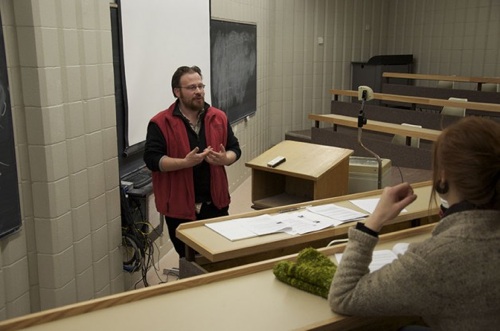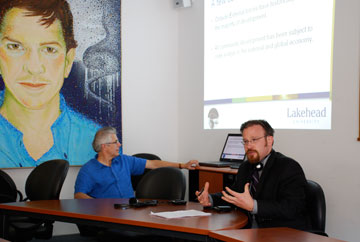Lakehead students have exciting opportunity to participate in exciting exchange!
Erin Collins,
News Editor, The Argus
November. December. January. February. Winter in Thunder Bay seems to drag on forever. Wind-chill, frostbite, and stalled cars are just a few delights that accompany this time of year. It's perfectly normal for all Thunder Bayers to start dreaming of pineapple drinks on faraway islands, lazing in the sand, and getting a nice tan.
The worst thing about winter is the monotony. Same old, same old. Same temperature, same snow, same wind, same place. But what about the same weather in another place?
What if you could spend a semester abroad furthering your education while having the experience of a lifetime? That sounds anything but monotonous.
January-February is admittedly the most difficult of times to contemplate an exchange opportunity in the Circumpolar North (Hawaii or Jamaica may seem more enticing). However, the chance to go abroad and explore another place while earning credit is the opportunity of a lifetime. And well worth the snow and cold that may follow you there.
This exciting exchange is available through the North2North Circumpolar Student Mobility Program. Established in 2003, this program is promoted and provided by the University of the Arctic (UArctic), a collection of international schools throughout the eight countries of the Circumpolar North. UArctic is a firm believer that in order to learn something, you need to live it, and books or videos can't replace real-life experience.
Lakehead University is a proud member of this unique initiative and so far has had nine students participate (however, more spots have been available). The North2North exchange isn't only geared toward certain academic programs, it's open to everyone.
A successful undergrad applicant may be placed in Finland, Russia, Norway, Sweden, or Iceland. During their placement, students will take a variety of courses, which may focus on culture and society, ecology, economic development, adaptation of technology in the circumpolar region, and other exciting and relevant topics.
For those who are concerned about the costs – likely the majority of interested students – have no fear!
"Students pay tuition to Lakehead University, which means they are still OSAP eligible and keep their scholarships," says Dr. Michel Beaulieu, site coordinator at Lakehead. "In addition, successful applicants will receive a mobility grant to facilitate their stay at the host institution."
Participating students also have the opportunity to earn credit while having their adventures. The courses offered by the UArctic are assigned credit values based on the European Credit Transfer System (ECTS), which can then be used by the student's home institution to assign credit using its own system. While the student needs to make sure all requirements to earn the credit are met, the Registrar's office needs to approve the credit and allow for its transfer.
Dr. Beaulieu expresses that candidates for this opportunity a) will be studying in the UArctic Program b) are studying in another program with a strong northern emphasis, or c) can demonstrate how their academic goals can contribute meaningfully to the Arctic region.
As well, Dr. Beaulieu adds that ideal applicants "are dedicated to contributing to [their] northern community and the Arctic region, generally have an open-minded attitude to other cultures and ways of life, and have relevant personal experience that would enable [them] to make the most of [their] exchange experience."
If this sounds like you, don't miss out! The North2North Exchange isn't a vacation on the beach, it's so much more. Through this program, you have the opportunity to learn in a fellow circumpolar country, find out what it means to be a student of the North, and become an educated and active citizen of this unique piece of the planet. Bon voyage.
For more information, please visit http://northernstudies.lakeheadu.ca/



